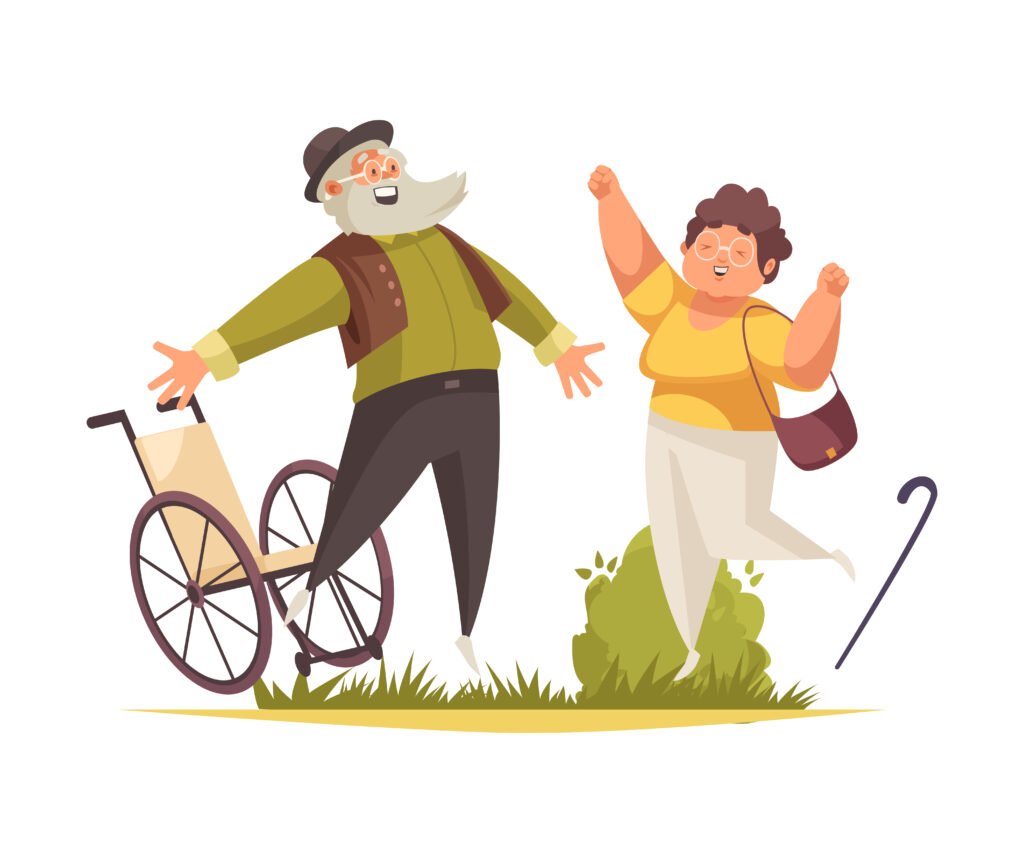
ethical aspects of elderly’s sexuality
Topic Overview
Within this topic, we focus on the importance of ethical aspects of sexuality in old age, the importance of ethical rights and dilemmas that arise in the context of expressing the sexuality of the elderly. Ethical dilemmas are more pronounced when an elderly person has reduced cognitive abilities or is ill.
Aims and objectives
Learning outcomes
Having successfully completed this topic you will be able to:
- Þ Understand the ethical aspects of elderly’s sexuality.
- Þ Understanding basic ethical rights in old age.
- Þ Understand the importance of expressing healthy sexuality.
- Þ Identify unethical behaviour regarding sexuality of older people.

Ethical rights: sexual activity, protection and determination of capacity
Nursing staff in nursing homes often face ethical dilemmas, especially in connection with dementia patients. Many report difficulties, confusion, embarrassment, shame, helplessness, as well as negative comments when they encounter sexuality between patients of different or same sexes, between patients and healthcare professionals, or between patients and visitors. Uncomfortable position and embarrassment related to sexuality occurs among health professionals, visitors, as well as family members. The result of all this is that the elderly are treated as children and separated from their partners. As a result, elderly patients are angry, even aggressive. The main dilemma that health professionals have is how to protect the elderly and his dignity, while at the same time fulfilling his desire to satisfy his sexual needs (Ehrenfeld, Tabak, Bronner, & Bergman, 1997).
When we deal with the issues of sexual behavior of residents with dementia, we have in mind the fundamental rights of patients. Depending on the individual country, persons must reach a certain age of consent for sexual activity. This is the age at which they are presumed to be capable of consent in the absence of evidence to the contrary. Firstly, it is necessary to ensure the right to adequate adaptation for consensual sexual relations in the case of demented patients due to respect for persons, their autonomy and privacy. Secondly, it is necessary to realize that every person has the right not to be subjected to sexual aggression without consent. Most sexual abuse, involving non-consensual physical sexual contact that does not necessarily constitute physical intercourse, occurs in nursing homes and involves sexual aggression between the residents themselves. It is imperative that nursing home managers are aware of their responsibilities and that they are obliged to take measures to reduce the risk of unwanted sexual contact that can lead to abuse. Given the high prevalence of dementia, it is necessary to introduce procedures for determining the capacity for sexual consent of an older adult with dementia. These realities point to a third right, the right to an authentic process by which professionals assess the capacity to consent of sexually active individuals with dementia (The society for post-acute and long-term care medicine, 2016).
Cognitive disability and sexuality
Some facts:
- People with cognitive disabilities can express their sexuality in satisfactory ways.
- Relationships and support from other people are essential in helping people with dementia to have healthy personal and sexual relationships.
- Sexual abuse or exploitation is always unacceptable and should always be treated as a very serious offense (Department of Health, State Government of Victoria, Australia, 2023).
It is very important to realize that sexuality is a key part of human nature. It means that people with cognitive disabilities experience the same range of sexual thoughts, attitudes, feelings, desires, fantasies and activities as everyone else. However, in order to be able to understand and be sexually active as much as possible, everyone must have adequate information from childhood.
Sexuality includes psychological, biological and social aspects, but the fact is that it is influenced by the values and attitudes of the individual. We also mature sexually during childhood and adolescence, and sexuality is a key part of an individual’s identity.
Positive sexuality must be built on healthy self-esteem and respect for others.
- People with cognitive disabilities may have helpful personal relationships, but some may need additional support to develop relationships, explore and express their sexuality, and access sexual health information and services. (Department of Health, State Government of Victoria, Australia, 2023).
Glossary & Acronyms
- Elder abuse – Elder abuse is used to describe a single or repeated act or lack of appropriate action which causes harm or distress to an older person or violates their human rights. It may include physical abuse, psychological abuse, sexual abuse, financial exploitation and neglect. Elder abuse happens everywhere, including at home within the family, at home with health and social care services, or in care institutions. It can be intentional or unintentional (‘bad care’) (AGE Platform Europe, 2023).
https://www.youtube.com/watch?v=jkOm1aKwl2E
(Alzheimer Society PKLNH, 2022)
Module 4.2
Ethics, Sexuality and Old Age

Ethical Aspects of Sexuality in Old Age
The main definition of ethics or moral philosophy includes the systematization, defence and recommending concepts of right and wrong behaviour (Parmar, 2021). Ethics deals with issues of human morality and the definition of concepts such as good and evil, right and wrong, virtue and vice, justice and crime (Flexner, 1993).
The availability of partners plays an important role in how the elderly experience sexuality. fullness. It is a fact that women live longer than men all over the world. As a result, older men, in contrast to older women, have significantly more opportunities to partner with the opposite sex and practice sexuality (Carr, 2004). About four out of five women over the age of seventy-five do not male sexual partners. In contrast, more than 60% of men in this same age group have a female partner. The aforementioned difference has major consequences for personal and public health. With the advent of prescription drugs that help men get an erection (Viagra), older men are more sexually active. Public healthcare problems are compounded as men age to seek the services of prostitutes and bring sexually transmitted diseases, including HIV, back to their older partners (Nack, 2006).
Everything is even more difficult for the elderly who suffer from dementia. In a marriage where one spouse suffers from dementia, moral and ethical dilemmas arise very quickly. What happens is that healthy partners leave the marriage more and more often, because they are not emotionally fulfilled, their needs begin to grow. As a result, due to the disease, individuals feel guilt, disapproval from family members, friends who do not have the knowledge and sense of how to deal with a demented person (Wornell, 2014). With the increasing number of institutions dealing with dementia patients, such as the institutions for the elderly, as well as in the home environment, there is a blurring line between guarding against neglect and abuse of residents, particularly those with dementia (Wornell, 2014). This is especially evident when it comes to sexuality in long-term care, and one of the examples of neglect is the ban on residents to express their opinion and sexuality. Also, not preparing residents for unwanted sexual activities by other residents represents abuse again. In this case, abuse can occur both on the part of a member of the medical and other staff or another resident member or resident to a simple case of mistaken identity in a confused dementia patient.
An ethical dilemma also arises in the use of drugs to increase or decrease sex drive in old age. The study showed that sexual activity declines over the years, but still continues in people over 50 (Kalra, Subramanyam, & Pinto, 2011). Moral and cultural values are also important in sexuality, which can also disrupt the normal process of sexuality in old age. A sexually active older woman may feel that her sexual expression is culturally inappropriate for her age, so she may ask her doctor for medication to help reduce her sexual desire. In this case, an ethical dilemma arises for the doctor, since respecting the patient’s autonomy has priority, but prescribing drugs in old age can also have negative consequences (Fujisawa & Sawada, 2004).
Video resources
Presentations
- The Ethics of Sexuality and Aging (mmlearn.org, 2013)Presenter: mmlearn

Funded by the European Union. Views and opinions expressed are however those of the author(s) only and do not necessarily reflect those of the European Union or the European Education and Culture Executive Agency (EACEA). Neither the European Union nor EACEA can be held responsible for them.
